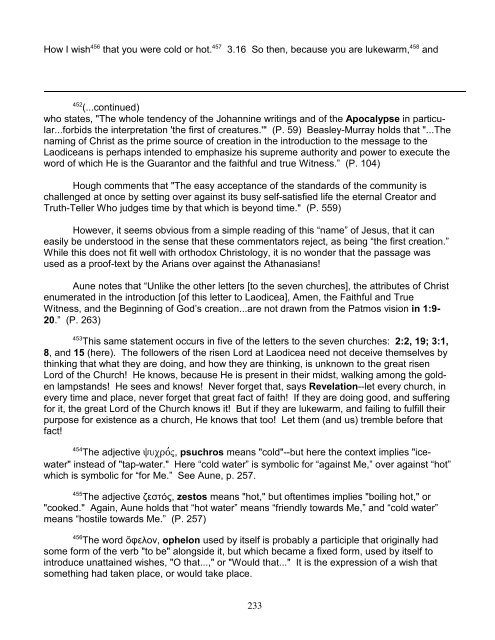Revelation 3:14-22 - Indepthbible.org
Revelation 3:14-22 - Indepthbible.org
Revelation 3:14-22 - Indepthbible.org
You also want an ePaper? Increase the reach of your titles
YUMPU automatically turns print PDFs into web optimized ePapers that Google loves.
456 457 458<br />
How I wish that you were cold or hot. 3.16 So then, because you are lukewarm, and<br />
452<br />
(...continued)<br />
who states, "The whole tendency of the Johannine writings and of the Apocalypse in particular...forbids<br />
the interpretation 'the first of creatures.'" (P. 59) Beasley-Murray holds that "...The<br />
naming of Christ as the prime source of creation in the introduction to the message to the<br />
Laodiceans is perhaps intended to emphasize his supreme authority and power to execute the<br />
word of which He is the Guarantor and the faithful and true Witness.” (P. 104)<br />
Hough comments that "The easy acceptance of the standards of the community is<br />
challenged at once by setting over against its busy self-satisfied life the eternal Creator and<br />
Truth-Teller Who judges time by that which is beyond time." (P. 559)<br />
However, it seems obvious from a simple reading of this “name” of Jesus, that it can<br />
easily be understood in the sense that these commentators reject, as being “the first creation.”<br />
While this does not fit well with orthodox Christology, it is no wonder that the passage was<br />
used as a proof-text by the Arians over against the Athanasians!<br />
Aune notes that “Unlike the other letters [to the seven churches], the attributes of Christ<br />
enumerated in the introduction [of this letter to Laodicea], Amen, the Faithful and True<br />
Witness, and the Beginning of God’s creation...are not drawn from the Patmos vision in 1:9-<br />
20.” (P. 263)<br />
453<br />
This same statement occurs in five of the letters to the seven churches: 2:2, 19; 3:1,<br />
8, and 15 (here). The followers of the risen Lord at Laodicea need not deceive themselves by<br />
thinking that what they are doing, and how they are thinking, is unknown to the great risen<br />
Lord of the Church! He knows, because He is present in their midst, walking among the golden<br />
lampstands! He sees and knows! Never f<strong>org</strong>et that, says <strong>Revelation</strong>--let every church, in<br />
every time and place, never f<strong>org</strong>et that great fact of faith! If they are doing good, and suffering<br />
for it, the great Lord of the Church knows it! But if they are lukewarm, and failing to fulfill their<br />
purpose for existence as a church, He knows that too! Let them (and us) tremble before that<br />
fact!<br />
454<br />
The adjective yucro,j, psuchros means "cold"--but here the context implies "icewater"<br />
instead of "tap-water." Here “cold water” is symbolic for “against Me,” over against “hot”<br />
which is symbolic for “for Me.” See Aune, p. 257.<br />
455<br />
The adjective æåóôüò, zestos means "hot," but oftentimes implies "boiling hot," or<br />
"cooked." Again, Aune holds that “hot water” means “friendly towards Me,” and “cold water”<br />
means “hostile towards Me.” (P. 257)<br />
456<br />
The word öåëïí, ophelon used by itself is probably a participle that originally had<br />
some form of the verb "to be" alongside it, but which became a fixed form, used by itself to<br />
introduce unattained wishes, "O that...," or "Would that..." It is the expression of a wish that<br />
something had taken place, or would take place.<br />
233

















